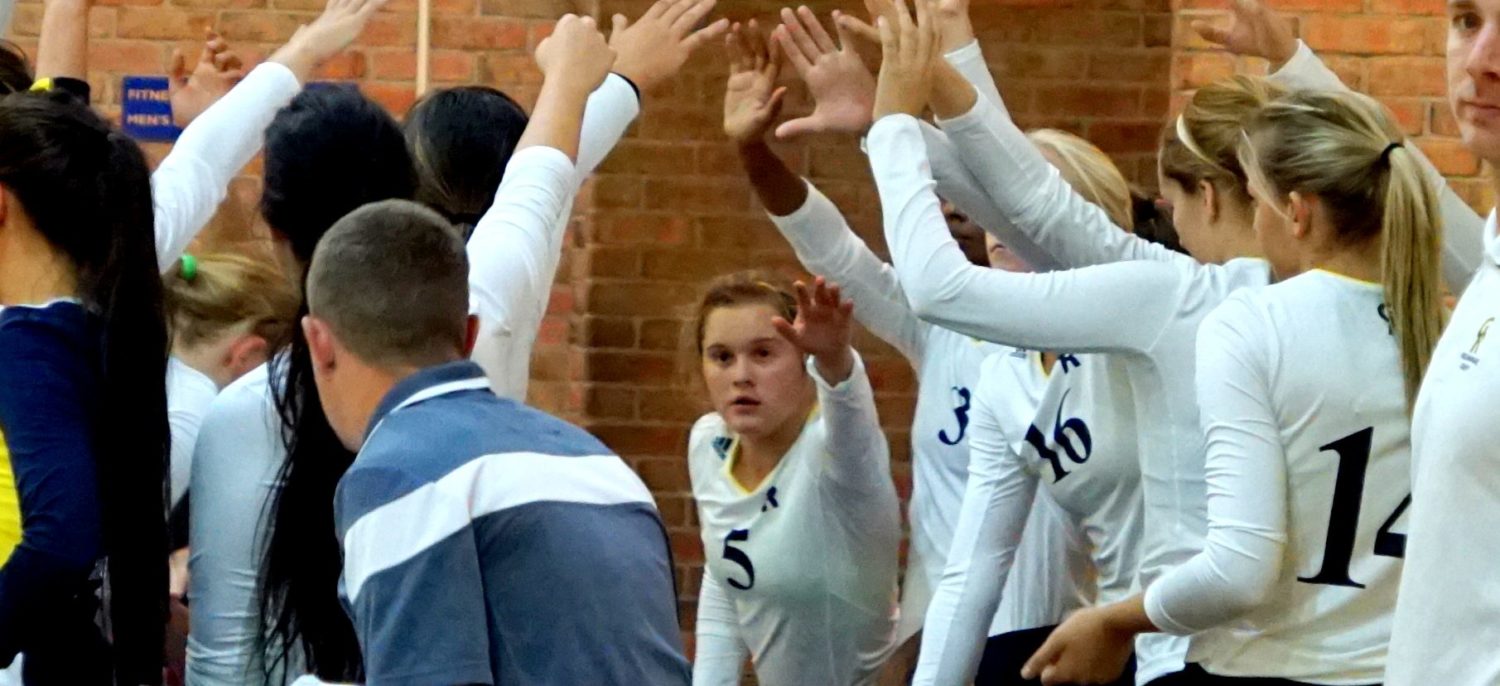By Steve Gunn
Local Sports Journal
MUSKEGON – The Muskegon Heights basketball program has had more than its share of defections and disappointments over the past few years.
In 2012 the name of the school changed, causing a stir and some resentment in the small, tight-knit community. The successful basketball coach left to take over the team in a neighboring school district. And a lot of talented players followed the coach out the door to various schools.
Then last November two of the team’s top players were lost on the eve of the new season, following their arrest for allegedly robbing a cab driver at gun point.
But somehow, almost incredibly, the winning tradition has survived.
A core group of determined athletes stuck with their school through the toughest of times, defending the legacy of one of the state’s greatest basketball programs.
Their perseverance has resulted in 37 victories over the past two seasons, a pair of district championships, and a regional championship.
Last year the Tigers surprised everyone by winning 17 games and advancing to the regional finals. This season they’ve already gone further, winning 20 games and a spot in Tuesday’s Class C state quarterfinals against Hillsdale at Vicksburg High School at 7 p.m.
The final scores of their regional games show how determined they are – they beat Kalamazoo Hackett 88-44 in the first round and New Buffalo 68-43 in the final.
Simply put, this is one tough, battle-tested bunch of Tigers, and there’s no telling how far they could go.
“We knew we could overcome,” said Muskegon Heights Coach Del Stewart, in his second year with the Tigers. “We just had to make some adjustments and some guys had to step up.
“If any team had proven it could be done, it was us.”
Those who stayed
The Muskegon Heights trophy case is decorated with six state championship basketball trophies – from 1954, 1956, 1957, 1974, 1978 and 1979.
There are also state runner-up trophies for 1993, 2003, 2005 and 2011.
But two years ago, a lot of people were wondering if the school would even have basketball, let alone a state-caliber team.
A state takeover, prompted by persistent academic failure and financial mismanagement, resulted in a lot of changes. A state-appointed emergency manager was put in charge of the district, and a private company was hired to manage it.
Muskegon Heights Public Schools became a charter school, Muskegon Heights Public School Academy. That may have been good news for students and parents from an academic perspective, but it could have been a fatal blow for athletics.
A lot of top high school athletes fled the school for other districts in the weeks following the transition. Rumors were rampant that sports would be eliminated in the new charter school.
And even if the new school fielded teams, there was a common perception that this wasn’t “the real Muskegon Heights,” but a state-imposed imposter that didn’t deserve community support, according to Stewart.
“It was an open flood gate,” said Stewart, referring to the number of athletes transferring to Muskegon, Mona Shores and other nearby districts. “You’re talking about a bunch of lifelong friends, having grown up together, then one leaves, and he starts encouraging others to come with him.
“And the kids that left were upper echelon kids. It’s one thing to say that a lot of talent left, but we lost a lot of kids with talent and varsity experience. It was a difficult transition. The expectation (for winning) hadn’t changed, but the talent level had. It was a difficult transition.”
The program may have been saved one day in August 2012, just a few days after Stewart accepted the head coaching job at Muskegon Heights, replacing the successful Keith Guy, who left to coach at Muskegon.
Stewart was taking his eight-year-old daughter for ice cream when he ran into Eddie Tornes, who was about to start his junior year of high school – at one school or the other.
“I asked Eddie where he was going to school, and he told me he didn’t want to leave, but if there were no sports, he was going to,” said Stewart, who previously coached at Reeths-Puffer. “I told him I had been named the coach, and he said he’d be back.”
That was a start.
Stewart asked Tornes to spread the word to other students who were interested in keeping the basketball team going. The coach opened the gym a few days later to see who might show up.
“A few kids showed up (at the first open gym session),” Stewart said. “Then word started circulating and there were even more a week later. They just filtered in. These kids were just more or less wanting to see if the Heights was going to field a basketball team.”
Stewart said the kids who stayed took the challenge of winning very personally. He said they wanted to be known as the “real Tigers,” – the ones who remained true to their school, even when some great players left.
“There was sort of a divide in the community, all sorts of talk that this was not the real Muskegon Heights anymore,” Stewart said. “In the midst of that, the kids that remained felt a sense that some people were threatening the reputation of their school, and they were going to show people.”
They certainly did. Despite the defection of several standout players from the year before, the Tigers shocked everyone by posting a 17-5 record and advancing to the Class C regional finals.
And the best part was that most of the key players, including all five starters, were underclassmen. Expectations ran high for the 2013-14 season.
Filling in the gaps
Steward said he sensed something was wrong when he woke up late one morning last November and found a bunch of messages on his cell phone.
He was in a hurry and headed off to school without checking the messages. But just as he entered the building, several people broke the news – Jeff Jordan and Carlos Hudson – two starters from the season before, had been arrested on suspicion of robbing a taxi driver with a handgun, a serious felony punishable by years in prison.
Suddenly the Tigers were faced with the prospect of starting their season without two of their best players. That was particularly true for Jordan, who had led the team with a 16-point scoring average as a junior.
“The bottom of my stomach just fell out,” Stewart said. “I couldn’t believe it was real. I had just been with them the day before. The basketball part didn’t even hit me initially. What hit me was the severity of the infraction, and how these kids might have made a decision that had lifelong implications.
“The other players were pretty disappointed and upset, sort of in disbelief. You have to remember that some of these kids are related to each other – it goes a bit further than just being buddies and teammates. But we just kept talking about how this is another adversity that we had to get through.”
Stewart said he started with the team’s four seniors, reminding them they had a responsibility to fill in the gaps and keep their teammates motivated and committed.
“I met with Tornes, Aaron Sydnor and DeMonte Crosby,” he said. “I reminded them that they were the other returning starters, and they would have to take heavier roles. They accepted the challenge and played up. They decided, until everyone else was sold on the idea of moving forward and winning, they would do what they had to do to make sure we were solid.
“Kwamayne Anthony, a senior who doesn’t play as much, contributed a great deal with a lot of leadership. The leadership we received from those four individuals is probably why we were able to sustain things.”
Tornes has responded with a 24 point scoring average, while Sydnor has been adding about 21 points per game. Junior Antonio Jones and freshman Jalonte Johnson have worked their way into the rotation and plugged some holes.
And just as importantly, junior Marquise Gresham, who started slowly this season, has been pulling down about 11 rebounds per game. That’s a big key for the Tigers, according to Stewart.
“Early in the season Marquis was out of sync – he probably adjusted the least well to having a bigger role,” Stewart said. “But through the tournament he’s been averaging more than 11 rebounds. It’s been a huge factor. If we can rebound, we can run. And if we can run, we can win.”
So far the Tigers have impressed everyone with a 20-3 record. They defeated Saugatuck, Holland Black River and Western Michigan Christian to win a district title. They beat Kalamazoo Hackett and New Buffalo to win a regional title.
Now they will clash with Hillsdale, a 24-1 team that can run and play strong half-court offense, according to Stewart.
“They’re pretty good, very athletic, and everybody shoots well,” Stewart said of Hillsdale. “It’s really a contrast of style. They can run like us, but they also play a good half court with very good shooters. Whoever controls the tempo of the game will have an advantage.
“By the time you get to this point, you pretty much figure that every opponent is going to be pretty good. We’re going to have to play our best game to win.”









And a best game they played